
Linda Penner, Chair of the Board of State and Community Corrections
Composition: The Chair of the Board is a full-time paid position, appointed by the Governor and subject to Senate confirmation.
Linda Penner was appointed Chair of the Board of State and Community Corrections (BSCC) by Governor Edmund G. “Jerry” Brown in 2013, after serving as a member of the Board since its inception in 2012 and as a member of its predecessor, the Corrections Standards Authority Board, since 2007.
Creating a culture of integrity and professionalism through fairness and equity is a priority for Ms. Penner and under her direction, the BSCC has made a tremendous impact on community corrections throughout the state. Under her leadership, the BSCC has expanded its grant portfolio to approximately $400 million annually in federal and state funds that support public safety, reentry, and rehabilitative efforts through local jurisdictions and community-based organizations. These programs included launching the Proposition 47 and the Adult Reentry Grant programs. Most importantly, Ms. Penner has spearheaded efforts to garner valuable input from advocates in the field, as well as those impacted by the justice system as victims, family members, or formerly incarcerated through public hearings, information gathering sessions, and the development of Executive Steering Committees.
Ms. Penner provided leadership during the implementation of the enhanced facility inspection process, which doubled the number of local detention facility inspections conducted during each biennial inspection cycle and ensures that regulation revisions reflect national best practices. Ms. Penner continues to provide critical guidance in the implementation of the In-Custody Death Review Division at BSCC, for which she continues to provide guidance.
Ms. Penner served as Chief Probation Officer for the County of Fresno from 2005 to 2012. Through her stewardship the department transitioned to Evidenced-Based Practices for recidivism reduction while ensuring community safety. As Chief, Ms. Penner led the local effort introducing the concepts of Public Safety Realignment through innovative supervision and service programs designed to reduce recidivism, including a multiagency supervision team and evidence-based services.
In 2011, Ms. Penner served as the president of the California Probation Officers Association of California, working closely with Governor Brown on the design and implementation of the groundbreaking Public Safety Realignment legislation that has impacted justice reform nationwide.
|

Jeffrey Macomber, Secretary, California Department of Corrections and Rehabilitation (CDCR)
Composition: Ex-Officio Member
Jeff Macomber’s career at CDCR has spanned nearly three decades, beginning as a Correctional Officer at Ironwood State Prison in 1993. He has diverse experience at CDCR, including leadership roles in custody, administration, and health care.
Secretary Macomber served in various roles at CDCR Headquarters from 1994 to 2004, then as Correctional Business Manager at Richard A. McGee Correctional Training Center from 2000 to 2004. He was Chief of the Program Support Unit and Transportation Unit from 2004 to 2007, and then started at California State Prison-Sacramento (SAC) as a Correctional Administrator in 2008. While at SAC, Macomber served as Chief Deputy Warden in 2009, then again from 2010–2013, and as Warden from 2013–2016. Following his tenure at SAC, he became Deputy Director of Facility Support in the Division of Adult Institutions from 2016 to 2018. In 2019, Mr. Macomber served as the Director of Corrections Services for California Correctional Health Care Services before becoming the Undersecretary of Administration. In late 2020, he transitioned to Undersecretary of Operations and in December 2022, was appointed Secretary.
|
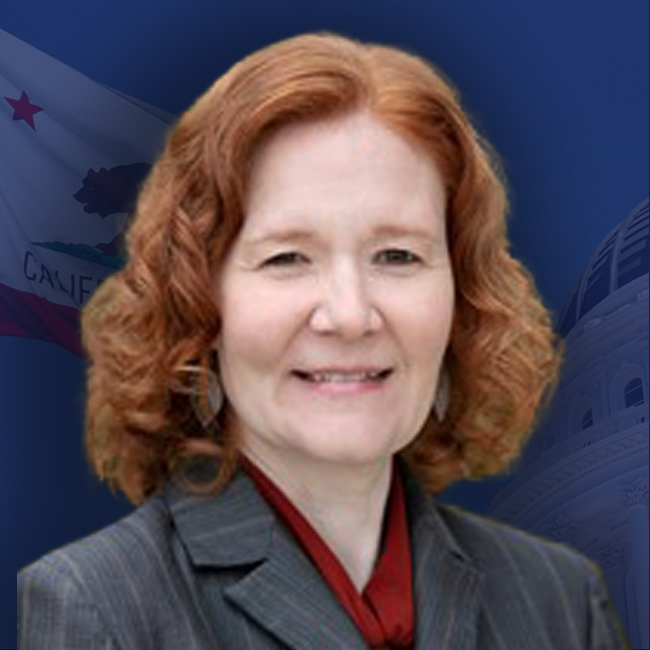
Dr. Heather Bowlds, PsyD, Director (A), Division of Adult Parole Operations, CDCR
Composition: Ex-Officio Member
Dr. Heather Bowlds is the Acting Director of the California Department of Corrections and Rehabilitation, Division of Adult Parole Operations (DAPO). Dr. Bowlds graduated with a doctorate degree in Forensic Psychology from the California School of Professional Psychology. During her twenty-six-year career with CDCR, Dr. Bowlds also held the positions of Coordinator of the Sexual Behavior Treatment Program, Associate Director of Mental Health, Deputy Director, and Director of the Division of Juvenile Justice. In January of 2024, she was named the Deputy Director of Division of Adult Parole Operations and in December of 2024 was named the Acting Director.
Dr. Bowlds specializes in the treatment of adolescents who have engaged in sexually abusive behavior and her career trajectory has taken her to national prominence in the treatment of juvenile sexual offenders. Dr. Bowlds is the recipient of the 2014 Christine M. West Award, in recognition of significant contributions made to the field of forensic mental health by the Forensic Mental Health Association of California.
|
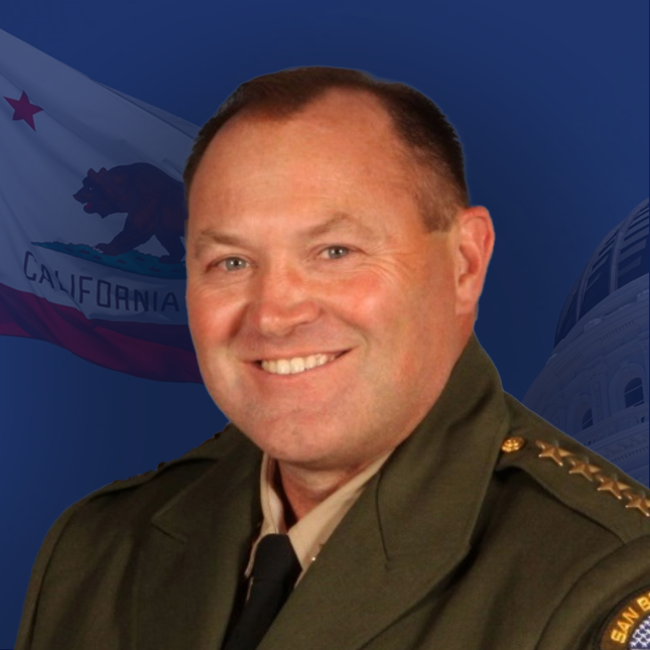
Eric Taylor, Sheriff, San Benito County
Composition: A county sheriff in charge of a local detention facility which has a BSCC rated capacity of 200 or less inmates, appointed by the Governor, subject to Senate confirmation
Eric S. Taylor is the 16th Sheriff-Coroner (Marshal) of San Benito County. He was most recently assigned as a Captain and Commander of the Operations Division prior to his appointment to Sheriff-Coroner in June of 2021 and Election as Sheriff-Coroner in June of 2022. His term began January 3, 2023.
San Benito County has approximately 68,000 residents and spans nearly 1400 square miles. The Office provides patrol and investigative services to the unincorporated county areas. The Sheriff operates the county jail system, provides marshal services to county residents, provides security to the superior court, maintains a search and rescue team, provides coroner services, and contracts law enforcement services to one of two incorporated cities within the county. The Office consists of 34 sworn personnel, 36 non-sworn correctional officers and 10 professional employees. Our annual budget is approximately 16 million dollars.
Eric was born and raised in Watsonville, California. After high school, Eric went on to college at San Diego State University. While there, he entered the “Police Cadet” program at the San Diego Police Department. This experience fueled his passion for entering into policework. Prior to his policing career, Eric was the Stadium Operations Manager for the Oakland Athletics Baseball Co. In 1999, he left the A’s to pursue law enforcement in his hometown of Watsonville. In 2014, Eric left the Watsonville Police Department and became the Operations Captain for the San Benito County Sheriff’s Office. In addition, he is a founding member of the Family Impact Center with First 5 San Benito, a founding member of the Opioid Task Force in San Benito County, a Hollister Rotarian, a Director for the San Benito Saddle Horse Show & Rodeo, a member of LULAC and the LULAC Farm Worker Task Force and was the Co-Chair of the Child Abuse Prevention Council. Sheriff Taylor draws on his experience from the Watsonville Police Department where he was a Patrol Officer, Field Training Officer, Corporal, Gang Detective, Task Force Member, Patrol Sergeant, and Detective Sergeant.
Eric and his wife moved to Hollister in 2003 and have raised their children in San Benito County. Eric’s wife was born and raised in Michoacan, Mexico and their two daughters are of dual ethnicity. It is his immersion in the Mexican culture that has fueled Eric’s work with the Migrant Farmworker Task Force, LULAC, the San Benito County Latino Coalition and his launch of a program from Watsonville Police Department called “Agua con la Chota.”
Once he took over as Sheriff-Coroner of San Benito County, Eric has worked internally to bring a new level of structure, accountability, and customer service. He has a deep love and passion for his farming/ranching community and strives to make his office better each and every day.
|

Vacant, Sheriff
Composition: A county sheriff in charge of a local detention facility which has a BSCC rated capacity of over 200 inmates, appointed by the Governor, subject to Senate confirmation
|

Vacant, County Supervisor or Administrative Officer
Composition: A county supervisor or county administrative officer. This member shall be appointed by the Governor, subject to Senate confirmation
|
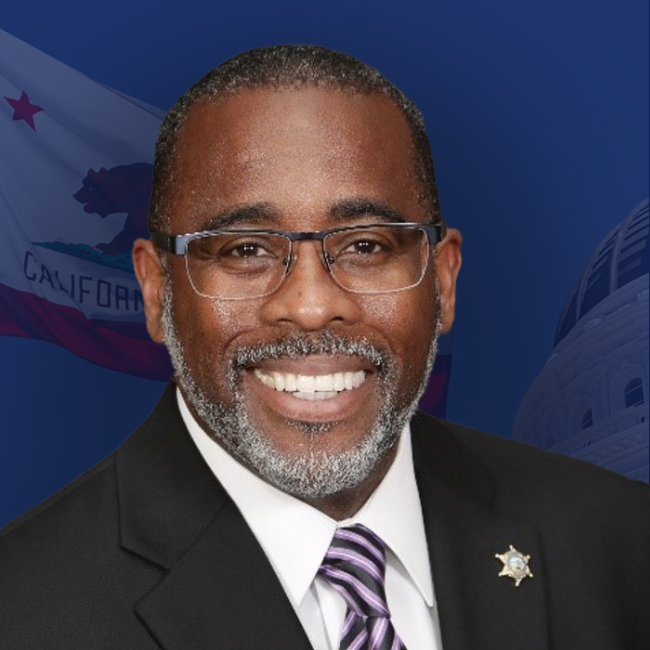
Kirk Haynes, Chief Probation Officer of Fresno County
Composition: A chief probation officer from a county with a population over 200,000, appointed by the Governor, subject to Senate confirmation
Chief Kirk Haynes, a 27-year veteran of the Fresno County Probation Department, is a graduate of the University of Oregon, and United States Marine Corps Reserve veteran. During his Probation career, Chief Haynes worked multiple assignments in the Adult, Juvenile, and Institutional Divisions. He led the department’s efforts in the design and implementation of the Community Corrections Performance Incentive Act of 2009 (SB 678), and the department’s AB 109 program established by the California Public Safety Realignment Act of 2011.
A primary tenet of this historic legislation was the introduction of Evidence-Based Practices (EBP). He quickly became the department’s leader in EBP and has spent countless hours training staff and representing the department’s goals and strategies to the Courts, and other justice and community-based partners. As Chief, he is committed to deploying innovative interventions with good research support that encourage positive quantifiable outcomes.
Chief Haynes is a strong advocate for developing staff’s ability to provide effective supervision through identifying the individual risks and recognizing cultural inequities impacting those we supervise in the community. He encourages a continual reexamination of the department’s service delivery, which is fundamental to sound culturally sensitive, evidence-based practice development. He continually reinforces how the work of Probation directly correlates to public safety, striking the balance between Probation’s multi-faceted role as law enforcer, protector of victims, and advocate for the clients they serve.
|
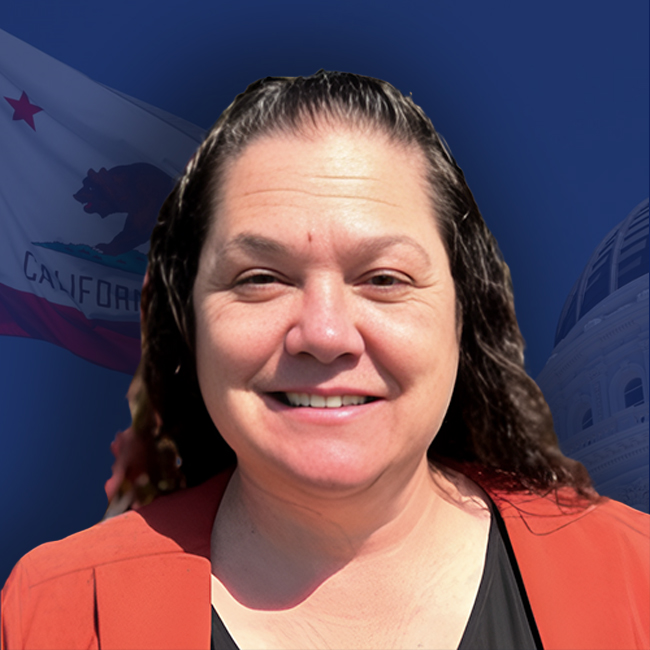
Jennifer Branning, Chief Probation Officer, Lassen County
Composition: A chief probation officer from a county with a population under 200,000, appointed by the Governor, subject to Senate confirmation
Jennifer Branning, of Susanville has been the Chief Probation Officer at the Lassen County Probation Department since 2013. She started her career as a Deputy Probation Officer in 2007 with the juvenile division. Chief Branning served as the President of the Chief Probation Officers of California in 2023. She began her career in Lassen County in 2005 at the Lassen County Child Welfare Department and prior to that worked with adults with developmental disabilities. She is passionate about providing quality evidence-based programs and services to Justice involved individuals. Chief Branning earned a Bachelor of Science degree in Applied Studies from California State University, Dominguez Hills.
|

Janet Gaard, Retired Judge, Yolo County
Composition: A judge appointed by the Judicial Council of California
Janet Gaard was appointed to the Yolo County Superior Court in 2008. She presided over criminal, juvenile, civil, and family law cases, and she served as the court's Presiding Judge and Assistant Presiding Judge. For many years, she presided over the court's collaborative courts, and, in 2019, she was awarded the Yolo Outstanding Mental Health Community Service Award from the local chapter of the National Alliance on Mental Illness. Gaard began her legal career in 1983 as a staff attorney for the Third District Court of Appeal. In 1984 she joined the California Office of the Attorney General, where she remained until her judicial appointment. She served as a Deputy Attorney General in the Criminal Division; Special Assistant Attorney General and Director of Legislative Affairs; and Chief Assistant Attorney General for the Division of Public Rights.
|

William "Bill" Scott, Chief of Police, City of San Francisco
Composition: A chief of police, appointed by the Governor, subject to Senate confirmation
San Francisco Police Chief William Scott was sworn in by Mayor Ed Lee on January 23, 2017, after serving 27 years in the Los Angeles Police Department where he rose to the rank of Deputy Chief.
He has been focused on implementing 21st Century Policing reforms to address public safety and reduce crime in San Francisco. Chief Scott’s reform efforts have been nationally recognized as a way to build trust with communities and improve a sense of legitimacy in policing that have led to better public safety outcomes for San Francisco. The reform project began with 272 recommendations from the Obama administration’s Department of Justice. When then-Attorney General Jeffrey Sessions abandoned to national reform project in 2017, Chief Scott reached out to the California Department of Justice to partner in overseeing the SFPD’s voluntary reform initiative.
The SFPD submitted the final responses to the Department of Justice’s reform recommendations on April 1, 2024. Chief Scott has created a foundation to ensure the department continues to build on its reform initiative. While working to establish a national model for police reform, Chief Scott has led the department through challenging times, including the global COVID-19 pandemic and a national crisis in policing, following the murder of George Floyd in Minneapolis. Violent crime in San Francisco has remained far below other major cities in the United States while clearances for violent crimes like homicides are well above the national average. Chief Scott has embraced new and innovative ways to address some of San Francisco’s biggest challenges, like auto burglaries, organized retail theft, and other property crime. He developed new crime-fighting strategies and implemented technologies like ALPR cameras and drones that have had significant results in identifying and arresting suspects.
Chief Scott grew up in Birmingham, Alabama, and is married with three children. He attended the University of Alabama where he earned a degree in accounting. He is also a graduate of Senior Management of Institute of Policing.
|
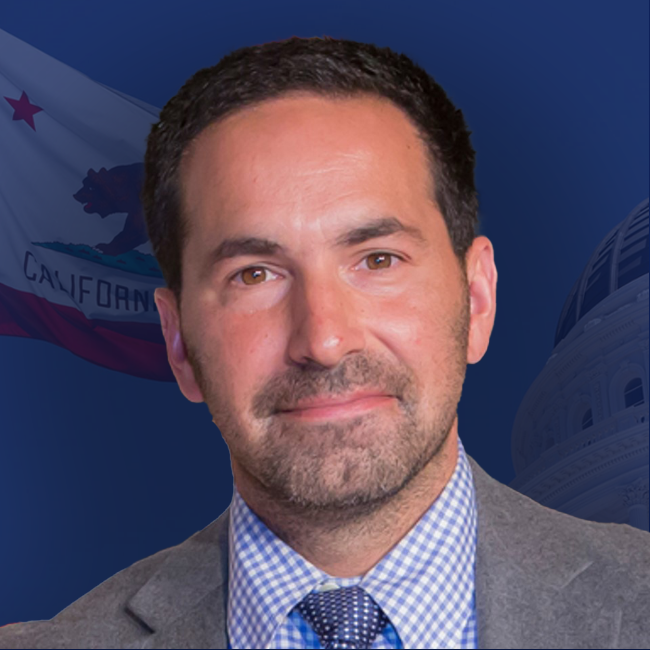
Scott Budnick, Founder of Anti-Recidivism Coalition
Composition: A community provider of rehabilitative treatment or services for adult offenders, appointed by the Speaker of the Assembly
Scott Budnick is the founder of the Anti-Recidivism Coalition (ARC), an organization of very high-achieving formerly incarcerated young adults who work to support one another, while stopping the flow of men and woman into the criminal justice system.
Mr. Budnick grew up in Atlanta, Georgia and graduated from Emory University in 1999 with degrees in Business and Film. He began his film career working in casting and as an Assistant to director Todd Phillips for DreamWorks. He went to work for TriStar Pictures chairman, Mike Medavoy at Phoenix Pictures, and worked first-hand in the development of over forty films. He later returned to work with Phillips and was chosen as Executive Vice President of Phillips’ Production Company producing projects under the Green Hat Films banner, now based at Warner Bros Studios. He has produced such films as the The Hangover series, Old School, Project X, Starsky and Hutch, School for Scoundrels, and Due Date.
Mr. Budnick is a fierce champion for children in need. For his work with youth in the criminal justice system, Governor Jerry Brown named him California’s Volunteer of the Year for 2012. He also received the Volunteer of the Year award from the Los Angeles County Supervisors and was interviewed by Chelsea Clinton for NBC Nightly News, Making a Difference series. He is a teacher and sits on the advisory board for InsideOUT Writers, is a board member of the Los Angeles Conservation Corps, and is a member of the advisory board for the Loyola Law School, Center for Juvenile Law and Policy.
In addition to the above, Mr. Budnick works closely with the Los Angeles Probation Department, the Los Angeles Sheriff’s Department and the California Department of Corrections and Rehabilitation, in giving incarcerated youth a path to education, success and rehabilitation before their release. He can often be found walking the tiers of California jails and prisons on his nights and weekends, giving hope and words of advice to the many incarcerated youth who have been through his classes.
|

Angeles D. Zaragoza, Attorney, Deputy Executive Director, Youth Justice Programs, Los Angeles Room and Board
Composition: A community provider or advocate with expertise in effective programs, policies, and treatment of at-promise youth and juvenile offenders, appointed by the Senate Committee on Rules
Angeles currently serves as the Deputy Executive Director for Youth Justice Programs at the Los Angeles Room and Board, where she is dedicated to advocating for and improving the lives of young people. Prior to this role, she worked as a Resource Attorney with the Los Angeles County Alternate Public Defender’s Office, specializing in special education advocacy and representing detained youth as the Division of Juvenile Justice (DJJ) Attorney.
Angeles earned her law degree from UCLA School of Law and holds a B.A. from UC Berkeley. Deeply committed to her community, she resides in East Los Angeles with her husband and their two young sons.
|

Norma Cumpian, Assistant Deputy Director, Women's Department, Anti-Recidivism Coalition
Composition: A public member, appointed by the Governor, subject to Senate confirmation
Norma Cumpian, the Anti-Recidivism Coalition’s (ARC) Women and Non-Binary Services Manager, joined ARC in March 2016 as a Life Coach after nearly five years working in the criminal justice reform and nonprofit sector. As a formerly incarcerated woman, Norma has firsthand experience in the many challenges of reentry, making her a compassionate and effective guide for young people learning to navigate society after coming home from prison.
Norma is a fierce advocate for incarcerated women and girls. She has traveled to the California State Capitol to educate legislators, spoken on panels, and presented in numerous classrooms in order to affect change for incarcerated women, mothers, and girls and to create a fairer justice system for all. In 2019, she co-designed and launched ARC’s first Women and Non-Binary Services department to better serve the needs of 1,300+ formerly incarcerated members, as well as 50+ incarcerated women through inside programming at the California Institution for Women in Corona, CA. In all of her work, Norma seeks to carve out spaces to ensure that everyone’s voices are heard and valued.
|

Dr. Karen Lai, MD, Berkeley, Alameda County
Composition: A licensed health care provider, appointed by the Governor, subject to Senate confirmation
Holding a medical degree from Duke University and a Master of Public Health from University of California, Los Angeles, Dr. Karen Lai is a board-certified child and adolescent psychiatrist dedicated to improving mental well-being for underserved individuals and communities. This is reflected in her previous work with The People Concern in Los Angeles County, where she provided psychiatric care to at-risk homeless individuals via mobile teams. Within the Contra Costa County Behavioral Health clinics, which serve primarily Medi-Cal recipients, she currently specializes in treating children, adolescents, and young adults at risk for or diagnosed with a serious mental illness.
Dr. Lai's work extends beyond clinical practice to include advocacy for mental health policy reform and integration of mental health services into primary care, school, and other community-based settings. She has served as a Resident Scholar with the American Academy of Child and Adolescent Psychiatry in Washington, DC, learning more about and advocating for child psychiatry policy issues. While she was a child and adolescent psychiatry fellow, she also held a chief position at UCLA Health, working on integrating internet-based Cognitive Behavioral Therapy (iCBT) into primary care clinics to improve accessibility to mental health resources. Finally, she has contributed to peer-reviewed publications and presented at national conferences on the topic of integrating mental health services into primary care and school-based health centers, highlighting her commitment to accessible mental health care for all.
|

Dr. Gena Castro Rodriguez, PsyD, LMFT, San Francisco, California
Composition: A licensed mental or behavioral health care provider, appointed by the Governor, subject to Senate confirmation
Dr. Gena Castro Rodriguez is a licensed Marriage and Family Therapist, educator, and recognized thought leader with over 30 years of experience in mental health, trauma-informed care, and community wellness. Based in San Francisco, she has dedicated her career to expanding mental health services and promoting resilience within underserved communities.
Dr. Castro Rodriguez previously served as Executive Director of the National Alliance for Trauma Recovery Centers at UCSF, Chief of Victim Services for the San Francisco District Attorney’s Office, Director of the Survivor Center for the Prosecutors Alliance, and Co-founder and Executive Director of the Youth Justice Institute. In these roles, she has championed culturally responsive practices and policies that center equity and healing.
Currently, Dr. Castro Rodriguez is an Associate Professor in the Graduate Counseling Psychology program at the University of San Francisco. In addition to teaching and conducting research, she has been instrumental in advancing the mission of the university’s Center for Community Wellness.
A sought-after speaker and consultant, Dr. Castro Rodriguez offers expertise in trauma recovery, restorative justice, and the intersection of mental health and social justice. Her work continues to inspire transformative approaches that empower individuals, families, and communities.
|

















